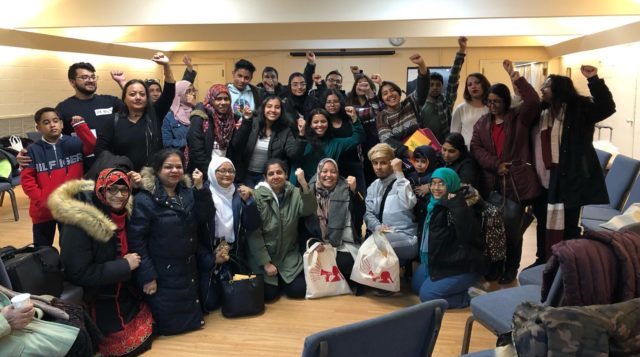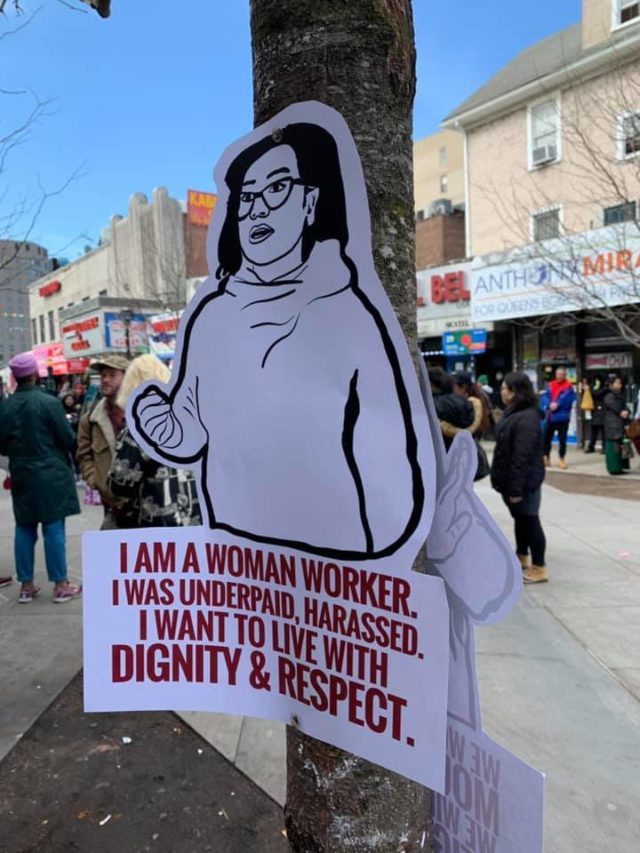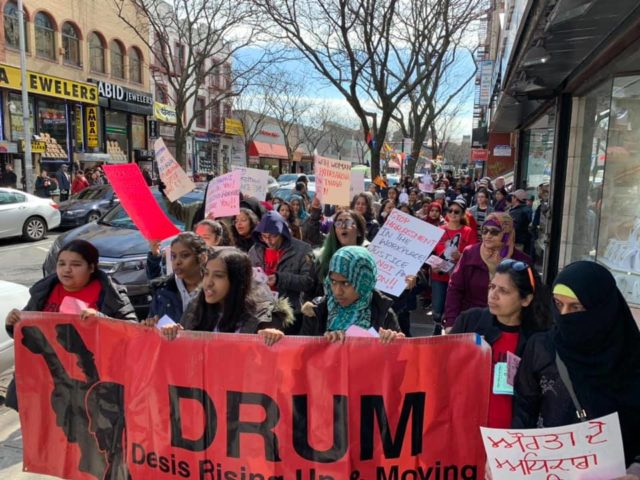“Movement spaces may do a better job in making shifts but they are not immune to the patriarchal tendencies inherent in society at large.” – Jensine Raihan
RISE Together Fund is committed to advancing the leadership, wellness, and resilience of women and nonbinary movement organizers in our field. Women constitute 80% of our grantee executive directors, and are often the unsung heroes of our social movements. Since 2017, RISE Together Fund has funded resilience and leadership development resources for cohorts of women in our field.
And throughout 2021, RISE Together Fund will be featuring our grantees’ women and nonbinary leaders, sharing their stories and successes, and lifting up their bold ideas for how we can achieve a thriving, inclusive democracy. We are pleased to kick this series off for Women’s History Month by featuring one of our longstanding grantees, Desis Rising Up and Moving (DRUM).
For years, DRUM has been integrating a gender justice model into their broader organizing for racial and economic justice. Founded in 2000, DRUM has mobilized and built the leadership of thousands of low-income, South Asian and Indo-Caribbean immigrants to lead social and policy change that impacts their own lives – from immigrant rights to education reform, civil rights, and workers’ justice. Our interview with DRUM’s Eckshate Program Founder Jensine Raihan details this critical work. Jensine is a Muslim Bangladeshi-Indian working-class first-generation immigrant, and is currently completing their final year at New York University.
Why is gender justice a core component of your organizing model? How does it intersect across other issue areas?
DRUM has historically centered the most targeted people in our communities, particularly undocumented women and girls. Girls and women bear the brunt of unjust immigration, policing, workplace, and educational injustices within families and yet lead the entire family in fighting back and organizing. They do this while having to work exploitative jobs to financially support the family and do the unpaid invisible reproductive labor that provides greater support to the family.
In the South Asian & Indo-Caribbean communities, where many girls and women are discouraged from exercising public leadership, DRUM has worked to dismantle many of the gender norms in our community and won respect for women-led community action on all issues affecting low-income people such as immigration and workers’ rights. Over 75% of our membership and leadership are women and girls. And we have built this model through intentionally prioritizing the recruitment, retention, and leadership development of women and girls in our community.
“Girls and women… lead the entire family in fighting back and organizing. They do this while having to work exploitative jobs and doing the unpaid invisible reproductive labor.”
Tell us about Eckshate, DRUM’s gender justice program.

DRUM began building out our gender justice work in 2016 through Eckshate, a program for low-income South Asian & Indo-Caribbean young women which has evolved over the years as a multigenerational and multi gendered approach to combat gender oppression. Eckshate means “together” in Urdu and Bangla. The idea, creation, implementation, and leadership for the Eckshate program came directly from our young women members who themselves were impacted by gender-based violence and wanted to create a space for others in the organization and community to process and take action on gender-based oppression.
Eckshate identified that a major obstacle to social transformation of our communities for women, girls, and for gender justice is not just what women can do, but rather in what transformation other pockets of our communities might need to move forward with us. We have identified these pockets as (a) men, who are the primary agents of women and girl’s oppression in our communities and (b) elder women, who are young women’s natural allies but are marginalized in a way that pits them against each other.
The Eckshate program has been successful in bringing together low-income girls and women in our community to build with one another against the isolation they experience, learn the basics of organizing for social change, to develop campaigns for gender justice in our communities, and incorporate a more explicit gender justice lens in all of our organizing work with all of our members shifting the culture of what leadership looks like in our communities.
What is the most important thing funders should know about why we need to center women and nonbinary leaders in our movements?
Women and non-binary folks have to constantly struggle for leadership and recognition in society regardless of the spaces they are in. Women and nonbinary folks have been the backbone of movements but often their labor and leadership do not get recognized or acknowledged fully. Movement spaces may do a better job in making shifts but they are not immune to some of the patriarchal tendencies inherent in society at large. So much of what happens on the backend is carried out and led by women and non-binary folks — but they do not always get the recognition they deserve.
Is there one story or a recent accomplishment that helps convey the impact of your gender justice work?

One of DRUM’s members, Nargis, is a single mother and an immigrant who used to work as a salesperson in a local jewelry store in Jackson Heights, Queens. Nargis was underpaid for four years at her work, the owner constantly verbally harassed her, and required her to take care of his mother at his home without any pay. Like many other workers, he regularly sexually harassed her in the workplace, making comments about her body and grabbing her. When Nargis stood up to him, he fired her. Nargis shared her story with DRUM and DRUM members and the Eckshate program members took action to support her and uplift the experiences of women in the community on International Working Women’s Day 2020. DRUM gender justice program members worked with Nargis to organize a protest in front of the store to call for justice for Nargis and all workers and women in the community. They hung images of our members with quotes in various languages throughout the neighborhood and marched around the neighborhood distributing gender justice materials to build awareness and to take action.
Through your gender justice programming and all of your programming, what is the future you hope to build?

I want Eckshate to lead to the creation of greater transformative organizing inside and outside of DRUM that represents women’s and gender non-conforming people’s interests and struggles. I hope Eckshate and our Gender Justice work can become a force in the community that not only deters gender based violence but actively shifts thinking and behavior that would not only visibilize women’s leadership and labor, both paid and unpaid, but also begins to counter and shift gender norms and beliefs in our communities.
“A future where we all can be our full selves without limitations.”